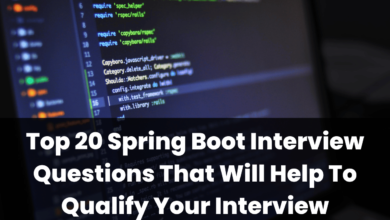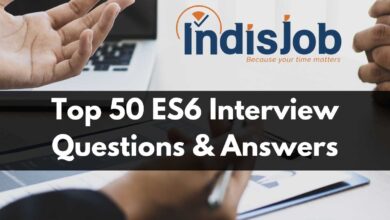Mastering HR Interview Questions & Answers: Your Ultimate Guide to Landing Your Dream Job

Navigating a job interview can be a nerve-wracking experience, especially when you’re facing the Human Resources (HR) interview. It’s the pivotal moment where your skills, qualifications, and personality must align with the company’s expectations and culture. The HR interview is not just about showcasing your professional achievements; it’s also about revealing your character and compatibility with the organization.
In this comprehensive guide on HR interview questions and answers, we delve into the art of acing these critical conversations. Whether you’re a seasoned professional looking for new opportunities or a recent graduate stepping into the workforce, understanding the most common and tricky questions posed by HR professionals is essential.

From “Tell me about yourself” to “Why should we hire you?” and “What are your salary expectations?” we’ll explore the intricacies of each question, providing insightful responses that demonstrate your value to potential employers. Furthermore, we’ll share tips on how to handle curveball questions and discuss strategies to leave a lasting, positive impression.
This guide isn’t just about memorizing answers; it’s about equipping you with the confidence and knowledge to tackle any HR interview with poise and authenticity. Let’s dive into the world of HR interview questions and answers, where your career aspirations meet the art of conversation.
HR Interview Questions & Answers:
Here are top 30 most asked HR Interview Questions & Answers:
Tell me about yourself:
Answer: I’m an experienced HR professional with a strong track record in talent acquisition and employee relations. I thrive in dynamic work environments and enjoy collaborating with diverse teams to achieve HR goals.
Sample Answer: I’m a passionate HR executive with over 5 years of experience. I’ve successfully managed recruitment, employee development, and HR compliance at my previous company. I’m known for my ability to build strong working relationships and my commitment to fostering a positive workplace culture.
What are your strengths and weaknesses:
Answer: My strengths lie in my excellent communication skills, adaptability, and attention to detail. On the flip side, I sometimes struggle with balancing my workload when faced with tight deadlines.
Sample Answer: One of my key strengths is my ability to effectively resolve conflicts and promote team cohesion. However, I’m constantly working on time management to avoid overcommitting and ensure I meet all deadlines.
Why do you want to work for this company:
Answer: I’m impressed by your company’s commitment to innovation and its reputation for fostering employee growth. I believe my HR expertise can contribute to your continued success.
Sample Answer: I’ve followed your company’s impressive growth and admire your dedication to employee development. Your values align with mine, and I’m excited about the opportunity to contribute to your dynamic team.
Describe a challenging situation you faced at work and how you handled it:
Answer: In a previous role, I faced a situation where there was a sudden staff shortage during a critical project. I quickly identified transferable skills within the team, provided training, and rearranged responsibilities to ensure project completion ahead of schedule.
Sample Answer: Once, during a tight deadline, a key team member fell ill. I stepped in to cover their responsibilities and organized a backup plan. We not only met the deadline but also received commendation from our client for our dedication and teamwork.
Where do you see yourself in five years:
Answer: In five years, I envision myself in a leadership role within HR, actively contributing to the strategic direction of the company’s HR initiatives.
Sample Answer: I aspire to become a senior HR manager within your organization, leading HR strategies that drive employee engagement, growth, and organizational success.
What motivates you:
Answer: I’m motivated by the opportunity to make a positive impact on employees’ lives and contribute to the success of the organization.
Sample Answer: What truly motivates me is helping employees reach their full potential and creating a workplace where everyone can thrive.
Why did you leave your previous job:
Answer: I left my previous job to seek a new challenge and an opportunity to grow in a larger and more dynamic HR department.
Sample Answer: I left my previous job because I felt I had reached a plateau in my career and was seeking an environment that would offer greater opportunities for professional development and advancement.
What do you know about our company:
Answer: I’ve done extensive research on your company and am aware of your recent achievements, market position, and commitment to sustainability.
Sample Answer: I’m well-informed about your company’s impressive growth, commitment to innovation, and dedication to fostering a diverse and inclusive workplace.
Can you explain gaps in your employment history:
Answer: During those gaps, I pursued further education and took short-term freelance HR consulting assignments to continuously develop my skills and stay updated.
Sample Answer: I had a brief gap in employment due to personal reasons, but I utilized that time to complete a certification program in HR management, which has further enriched my skill set.
How do you handle stress and pressure:
Answer: I handle stress by prioritizing tasks, seeking support from colleagues when necessary, and practicing mindfulness techniques like deep breathing and time management.
Sample Answer: When faced with stress and pressure, I maintain composure and focus on breaking tasks into manageable steps. This approach has consistently allowed me to meet deadlines and deliver quality work.
What is your preferred work style – alone or in a team?
Answer: I prefer a collaborative work style, where I can combine individual contributions with the power of teamwork. It allows for diverse perspectives and more innovative solutions.
Sample Answer: My preferred work style is a blend of both. I value independent work for tasks that require focused attention and teamwork for projects that benefit from collective insights and skills.
Describe a time when you disagreed with a coworker or supervisor.
Answer: I once had a disagreement with a coworker over project priorities. We resolved it through open communication, sharing our viewpoints, and finding a compromise that aligned with our team’s goals.
Sample Answer: In a previous role, I disagreed with my supervisor about the approach to a client presentation. I scheduled a meeting to discuss my concerns, offered alternative ideas, and we ultimately agreed on a revised strategy that proved successful.
How do you stay updated with industry trends?
Answer: I stay updated by regularly reading industry publications, attending webinars, and participating in relevant online forums. Networking with professionals in the field also helps me stay informed.
Sample Answer: To stay current with industry trends, I make it a practice to subscribe to industry newsletters, follow thought leaders on social media, and attend industry conferences to gain insights into emerging developments.
What skills do you believe are essential for this position?
Answer: Key skills for an HR executive include strong communication, conflict resolution, and strategic thinking. Additionally, a deep understanding of HR laws and regulations is crucial.
Sample Answer: In this role, essential skills encompass effective communication, critical thinking, and a comprehensive knowledge of HR policies and laws. These skills enable me to drive organizational success through effective HR strategies.
Tell me about a successful project you’ve worked on.
Answer: I managed a talent acquisition project where we reduced time-to-hire by 30% through process optimization. This project resulted in cost savings and improved candidate experience.
Sample Answer: One of my most successful projects involved leading a team to implement a new performance management system. It led to more transparent feedback, increased employee engagement, and ultimately, improved company performance.
How do you prioritize tasks and manage your time?
Answer: I prioritize tasks by setting clear goals, categorizing them by urgency and importance, and using time management tools like to-do lists and calendars.
Sample Answer: I manage my time effectively by employing the Eisenhower Matrix to categorize tasks, utilizing digital tools like project management software, and adhering to strict time blocks for focused work.
What do you enjoy most and least about your current or previous job?
Answer: I enjoy the opportunity to solve complex HR challenges and contribute to organizational growth the most. What I enjoy the least is administrative tasks that divert time from strategic HR work.
Sample Answer: I find the most enjoyment in driving positive changes through HR initiatives. Conversely, I find routine administrative tasks less fulfilling as they can take away time from more impactful HR projects.
Give an example of when you had to adapt to a change in the workplace.
Answer: I recently adapted to a change in our HR software system. I quickly embraced training and self-learning to ensure a smooth transition and minimal disruption.
Sample Answer: When our company underwent a restructuring, I adapted by proactively seeking training on new HR policies, maintaining open communication with employees, and providing support during the transition.
How do you handle difficult clients or customers?
Answer: I approach difficult clients with active listening, empathy, and a solutions-oriented mindset. I aim to address their concerns while upholding company policies and values.
Sample Answer: Handling difficult clients involves active listening, understanding their needs, and proposing solutions that align with our company’s capabilities. It’s about finding common ground while maintaining professionalism.
Explain a situation where you demonstrated leadership.
Answer: I demonstrated leadership when I led a cross-functional team to implement a diversity and inclusion initiative. This initiative resulted in improved employee engagement and a more inclusive workplace.
Sample Answer: In a prior role, I showcased leadership by spearheading a team through a challenging organizational change. I provided clear guidance, maintained team morale, and ensured the project’s success despite the obstacles.
What are your salary expectations?
Answer: My salary expectations are flexible and dependent on the overall compensation package, job responsibilities, and company’s market standards. I am open to discussing this in detail during the negotiation stage.
Sample Answer: “I believe in fair compensation that aligns with industry standards and the responsibilities of the role. I am flexible and open to discussing salary as part of the overall compensation package.”
How do you handle constructive criticism?
Answer: I view constructive criticism as an opportunity for personal and professional growth. I actively listen to feedback, remain calm, and focus on areas where improvement is needed. I then take steps to address those areas.
Sample Answer: “Constructive criticism is essential for growth. I listen attentively, reflect on the feedback, and take proactive steps to make necessary improvements.”
Describe a situation where you exceeded expectations.
Answer: In my previous role, I was tasked with improving customer satisfaction scores by 10%. Through enhanced customer engagement and service quality, I exceeded this target, achieving a 15% increase in satisfaction within six months.
Sample Answer: “I once exceeded expectations by surpassing a customer satisfaction goal of 10%, achieving a 15% improvement through enhanced service quality.”
What do you do to maintain a healthy work-life balance?
Answer: Maintaining a healthy work-life balance is crucial for productivity and well-being. I set clear boundaries, prioritize tasks efficiently, and make time for hobbies and family to recharge and stay motivated.
Sample Answer: “I prioritize work-life balance by setting boundaries, managing tasks efficiently, and dedicating time to personal interests and family.”
Can you provide an example of a time when you had to meet a tight deadline?
Answer: During a product launch, I faced a tight deadline. By organizing the team, streamlining processes, and working closely with stakeholders, we successfully met the deadline and launched the product on schedule.
Sample Answer: “I once led a team to meet a challenging deadline by streamlining processes and collaborating closely with stakeholders, resulting in a successful product launch.”
What do you know about our industry competitors?
Answer: I’ve researched your industry competitors, including their products, market share, and key strategies. This knowledge helps me understand the competitive landscape and identify opportunities for our company to excel.
Sample Answer: “I’ve extensively researched your industry competitors, understanding their products, market presence, and strategies, which can inform our approach.”
How do you keep your professional skills up to date?
Answer: I’ve researched your industry competitors, including their products, market share, and key strategies. This knowledge helps me understand the competitive landscape and identify opportunities for our company to excel.
Sample Answer: “I’ve extensively researched your industry competitors, understanding their products, market presence, and strategies, which can inform our approach.”
Tell me about a time when you failed and what you learned from it.
Answer: I once faced a project setback due to inadequate planning. I learned the importance of thorough preparation, project risk assessment, and proactive problem-solving. This experience made me a more resilient and effective professional.
Sample Answer: “I encountered a project setback due to inadequate planning. I learned the importance of thorough preparation and proactive problem-solving, which has strengthened my skills.”
What would you do if you were assigned a project outside of your expertise?
Answer: If assigned a project outside my expertise, I’d first assess its requirements and potential impact. Then, I’d quickly learn and adapt, leveraging available resources and seeking guidance from colleagues to ensure project success.
Sample Answer: “I’d assess the project, learn quickly, and collaborate with colleagues to ensure its successful completion, even if it falls outside my expertise.”
Why should we hire you for this role?
Answer: You should hire me because of my extensive HR experience, my ability to effectively communicate and collaborate with diverse teams, and my dedication to driving positive change within the organization. I am confident in my ability to contribute to the success of your company.
Sample Answer: “You should hire me for my HR expertise, strong communication skills, and commitment to driving positive change within the organization. I am confident in my ability to make a valuable contribution to your team.”
Conclusion: HR Interview Questions & Answers
Understanding the significance of discussing salary expectations, dealing with constructive criticism, recounting instances of exceeding expectations, and managing work-life balance can significantly impact the outcome of an HR interview.
Moreover, the ability to handle tight deadlines, stay updated on industry competitors, and learn from failures underscores a candidate’s potential for growth and success within an organization. Finally, articulating why one is the ideal fit for a role encapsulates the culmination of preparation and self-awareness.
In the world of HR interviews, preparation is key. Armed with the knowledge and confidence derived from the answers provided in this article, candidates can approach their interviews with poise and determination, ready to seize the opportunity and make a lasting impression on prospective employers.
Ultimately, the HR interview is not just about responding to questions but about conveying a compelling narrative that underscores one’s value and potential within a company.






